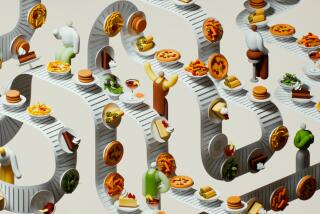‘Stuffed: An Insider’s Look at Who’s (Really) Making America Fat’ by Hank Cardello
In the fight against obesity, parents are shoving vending machines out of schools and state governments are falling over each other trying to legislate trans fats out of restaurants. Hank Cardello, a former food industry executive with Coca-Cola and General Mills, has his own solution, which he proposes in “Stuffed: An Insider’s Look at Who’s (Really) Making America Fat,” written with Doug Garr: Serve up a tasty, profitable business scenario and let the industry take the forefront in shrinking America’s growing waistlines. Cardello’s ideas may not win over food purists, but his ideas derive from practical, real-world experiences.
From the beginning, food providers were just giving Americans what they wanted, writes Cardello, who began his career marketing Betty Crocker cake mixes. Although Swanson TV dinners were born out of a desperate ploy to carve up surplus turkeys before they rotted, the huge popularity of what was really quick-serve airplane food revealed that Americans were hungering for fast and easy meals over quality. The spectacular profit-making machines of McDonald’s and other fast food chains just fed on the same growing trend.
“This was not an industry of evil people,” Cardello says. “No one ever set out to addict people to food or make them overweight.” But as one success begat another, food makers and restaurants favored affordable, high-calorie ingredients that eventually overwhelmed sedentary Americans.
That doesn’t mean the food industry is innocent. Consider the once modest-sized bagel or chocolate-chip cookie. A vendor can sell a humongous cookie for twice as much despite using just a few pennies more in ingredients. The downside? The consumer consumes many extra calories.
Grocery stores are to blame for obesity as well, Cardello explains. Shelves are stocked in a way that maximizes profits, often by pushing the least healthful foods on unsuspecting shoppers. Meat, for example, often is stationed in a far corner to force shoppers through the more profitable aisles laden with cookies, cakes and candy.
By the time food executives sensed culpability for the obesity epidemic, it was too late. Changing French fry oil at a large restaurant chain can have such a huge financial and taste impact that corporate buyers can’t risk profit margins for hard-to-measure health benefits. In another example, a Nestle executive explains that changing some of the ingredients in the ever-profitable Nestle Crunch bar could drive up the cost and cause a marketing nightmare.
Trying to enforce a solution is no answer, either, Cardello argues. Schools’ banning of cupcakes, once ubiquitous at classroom birthday parties, just angers parents and creates a backlash that obscures the original goal: healthy children.
Instead, food makers need a reason to make food healthful. Keeping customers alive longer is one such incentive, Cardello writes. Taking action before government forces a solution down corporate throats is another. “It’s up to the food sellers to solve the health crisis, not because they’re totally to blame, but because they are our last best hope,” Cardello writes. “They alone can make the difference, and it’s in their own interests.”
So big food makers should stop selling junk food? Well, not exactly. Cardello is an advocate of “stealth health,” that is, making junk food more healthful via reformulation without informing the public. After all, a “healthier” Big Mac might chase fans to another burger joint. By not telling customers that food is healthier, they’re much less likely to imagine a change in flavor or quality.
Cardello envisions a sort of junk food utopia where a Big Mac contains enough omega- 3s and phytosterols to cut cholesterol yet still tastes like a Big Mac. If that sounds far-fetched, consider Frito-Lay, which has switched to much more healthful sunflower oil from artery-clogging hydrogenated oils. If the food maker saves money along the way, all the better.
To speed the conversion to more healthful foods, Cardello suggests that big food makers and sellers contribute to a Food Superfund, which would find ways to fight obesity by making healthful food more affordable and junk food nutritious without sacrificing taste. The idea is to improve all foods in such a way that Americans “won’t have to figure out what’s good for us.” In other words, he wants Americans to have their healthful cake and enjoy eating it too.
Levy writes about parenting, health and environmental issues at www.dadtalk.net.
More to Read
The biggest entertainment stories
Get our big stories about Hollywood, film, television, music, arts, culture and more right in your inbox as soon as they publish.
You may occasionally receive promotional content from the Los Angeles Times.






